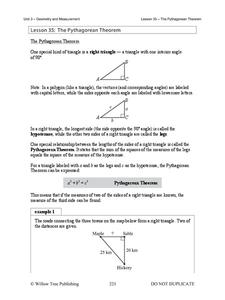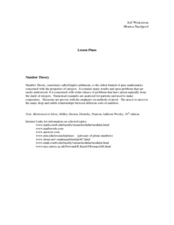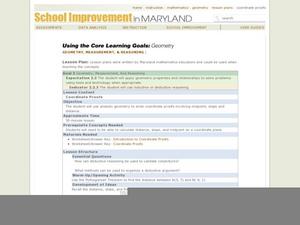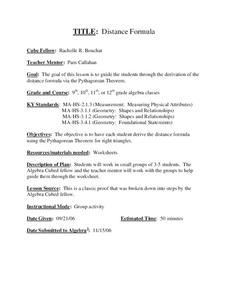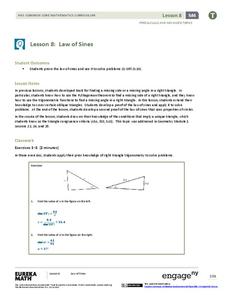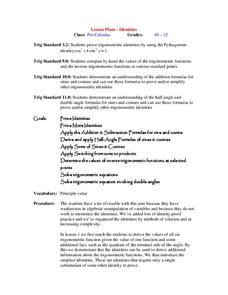Curated OER
Pythagorean Theorem
Students investigate the Pythagorean Theorem. In this seventh through twelfth grade geometery instructional activity, students explore the Pythagorean Theorem and its converse and use it to find the length of the missing side...
Curated OER
Central Valley Math Project
Middle schoolers study the Pythagorean Theorem. They describe what it means to square a number. Pupilsuse the Pythagorean Theorem to prove the sides of given triangles, and use geometric pieces of paper to create a right triangle and...
Curated OER
The Right Stuff
Studentsare introduced to the Pythagorean Theorem by exploring right triangles and the squares built on each side. They apply the Pythagorean Theorem to real-world problems. Students u se informal and nonformal arguments of proof (i.e.,...
Curated OER
Pythagorean Theorem Proof
Tenth graders investigate the Pythagorean Theorem. Then they type up a formal paragraph proof of a proof of their choice.
EngageNY
Ptolemy's Theorem
Everyone's heard of Pythagoras, but who's Ptolemy? Learners test Ptolemy's Theorem using a specific cyclic quadrilateral and a ruler in the 22nd installment of a 23-part module. They then work through a proof of the theorem.
Curated OER
The Pythagorean Theorem
Seventh graders relate the Pythagorean theorem to the real world. In this algebra lesson plan, 7th graders identify important properties of the Pythagorean theorem and use it to solve word problems. They create a step by step plan...
Curated OER
Picking Pythagoras
Students discover that side measurement is used in determining angle classification of a triangle. By squaring sides, they predict whether triangles be right, obtuse, or acute. They prove the Pythagorean Theorem and use it to solve...
Curated OER
Flying with Pythagoras
A lengthy narrative about Pythagoras and his students precedes an activity in which your young mathematicians practice using the Pythagorean theorem to solve three problems about flight and distance. Answers are provided.
EngageNY
Criterion for Perpendicularity
The Pythagorean Theorem is a geometry pupil's best friend! Learners explain the equation a1b1 + a2b2 = 0 for perpendicular segments using the Pythagorean Theorem. They are able to identify perpendicular segments using their...
Curated OER
Proving the Pythagorean Theorem
Young scholars solve problems using the pythagorean Theorem. In this geometry lesson, students complete proofs using the Pythagorean Theorem. They share their proofs and solutions with their classmates and family members.
Curated OER
Mathematical Proofs
High schoolers explore the nature of mathematical proofs and mathematical inquiry. They complete the activity "Using the Pythagorean Theorem". They read selected articles and participate in class discussions.
Curated OER
Pythagorean Theorem and Problem Solving
Students use the Pythagorean Theorem to solve problems. In this geometry lesson, students identify the properties of a right triangle. They find the missing side and angles of a right triangle.
Curated OER
Number Theory
Learners explore the concept of number theory. They discuss an assortment of number theory topics such as prime numbers, composite numbers, GCF, modular arithmetic, and others in a lecture style discussion. Pupils view videos about these...
Curated OER
Inequalities and Triangles
Learners prove and apply theorems of triangle inequality and hinge theorem. In this geometry lesson plan, students will discuss which triangle is bigger and why. They will use theorems, such as Exterior Angle Inequality or the...
Curated OER
Tangram Perimeters
Students work together to make figures out of tangram squares. In groups, they calculate the measurements they need and apply the Pythagorean Theorem. They complete a worksheet solving equations using the theorem and review their answers.
EngageNY
Law of Cosines
Build upon the Pythagorean Theorem with the Law of Cosines. The 10th part of a 16-part series introduces the Law of Cosines. Class members use the the geometric representation of the Pythagorean Theorem to develop a proof of the Law of...
Virginia Department of Education
Circles in the Coordinate Plane
Make the connection between the distance formula and the equation of a circle. The teacher presents a lesson on how to use the distance formula to derive the equation of the circle. Pupils transform circles on the coordinate plane and...
Curated OER
NON-EUCLIDEAN GEOMETRY.
Young scholars study relationships between angles, side lengths, perimeters, areas and volumes of similar objects. In this lesson students also create and critique inductive and deductive arguments concerning congruency, similarity and...
Curated OER
Coordinate Proofs
Learners explore the concept of coordinate proofs. In this coordinate proofs lesson, students write coordinate proofs using properties of distance, slope, and midpoint. Learners discuss why it is sometimes beneficial to double the...
Curated OER
Distance Formula
Students calculate the distance between two points using the distance formula. In this geometry lesson, students derive the distance formula using the Pythagorean Theorem.
Curated OER
The Shortest Distance
Students, working on their GED, examine the steps used to resolve the unknown sides of a right triangle. They express the square root function as an exponential function and derive the distance formula using principles of geometry.
EngageNY
Law of Sines
Prove the Law of Sines two ways. The ninth segment in a series of 16 introduces the Law of Sines to help the class find lengths of sides in oblique triangles. Pupils develop a proof of the Law of Sines by drawing an altitude and a second...
Curated OER
Identities and Trigonometric Values
Students solve trigonometric equations. In this precalculus lesson, students prove trigonometric identities using the Pythagorean Theorem. They apply the addition formulas for sine and cosine to prove different identities.
EngageNY
Graphing Systems of Equations
Expand on learners' understanding of quadratic-linear systems. Building on the graphic understanding developed in the previous lesson, pupils learn algebraic methods of solving the systems.





